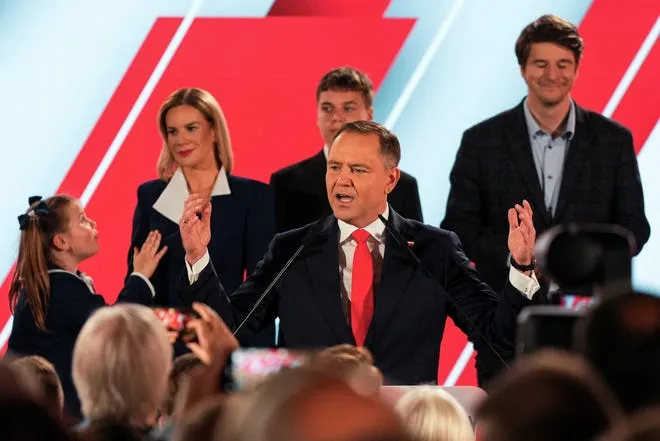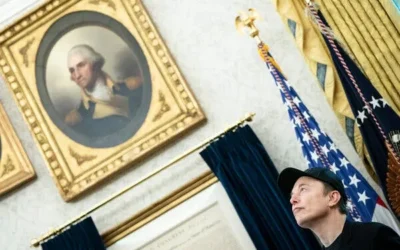Poland’s Hard-Right Triumph: Karol Nawrocki Elected President Amidst EU Tensions
In a surprising turn of events, Karol Nawrocki has emerged as the new president of Poland following a tightly contested election that has left Europe more divided than ever. The right-wing candidate, representing the Law and Justice Party (PiS), won the presidency by a razor-thin margin, igniting concerns over his approach to various pivotal issues that could reshape Poland’s relationship with the European Union and Ukraine.
The Election Landscape
The election was held under a cloud of tension and debate, with key issues such as EU governance, economic stability, and foreign policy taking center stage. Nawrocki’s campaign focused on a strong nationalist agenda that promised to prioritize Polish interests and sovereignty over EU directives. His opponents, primarily from the centrist Civic Platform party, argued that such an approach can lead Poland towards isolation and further strain against EU unity.
Who is Karol Nawrocki?
Nawrocki, a 43-year-old lawyer and politician, has been a prominent figure in Polish politics over the past decade. Known for his hardline views on immigration and his staunch opposition to EU regulations, Nawrocki has quickly risen to prominence within his party. His leadership style is characterized by populist rhetoric, appealing to the sentiments of many Poles who feel disconnected from mainstream politics.
He has consistently advocated for stricter border controls and has been critical of the EU’s stance on accepting migrants, which he argues undermines Polish culture and security. Nawrocki’s win signals a shift in Polish politics—one that could impact the country’s stance on relationships extending beyond its borders.
The Implications for the EU
With Nawrocki at the helm, European leaders are bracing for a more challenging relationship with Poland, particularly concerning EU policies on democracy, rule of law, and human rights. His election is seen as a breach in the EU’s previously unified front against populist and authoritarian trends.
Experts predict that Nawrocki will likely pursue a more confrontational approach towards the EU, reminiscent of Hungary’s approach under Prime Minister Viktor Orbán. There are fears that this could lead to Poland’s departure from shared policies on judicial reforms and media freedoms. Moreover, issues like funding and budgetary agreements could become contentious as Nawrocki’s administration seeks to assert Poland’s independence, potentially risking vital financial support from the EU.
Ukraine and Regional Security
Nawrocki’s victory raises significant questions about Poland’s approach to Ukraine, which has relied on Polish support in the ongoing conflict with Russia. Under the previous government, embassies were flooded with support for Ukraine, receiving praise from the West for its commitment. However, with Nawrocki’s nationalist stance, observers are uncertain about how Poland will navigate its critical role in the defense of Ukraine against Russian aggression.
Nawrocki has expressed support for Ukraine, but there are concerns that his administration may adopt a more transactional approach rather than the previously enthusiastic solidarity expressed by the outgoing government. His administration might stress economic ties and trade deals while prioritizing Polish interests above shared European concerns for security in the region.
Domestic Challenges Ahead
Nawrocki’s ascent to the presidency does not only pose challenges on the international stage; he must also navigate complex domestic issues. The economic aftershocks of the pandemic, rising inflation, and growing dissatisfaction among younger voters are some of the pressing issues awaiting his attention. Many Poles, particularly in urban areas, have expressed a desire for progressive policies that tackle climate change, digital innovation, and social justice.
Moreover, the division seen during the election campaign—between urban and rural living, progressive and conservative values—will require Nawrocki to find common ground to avoid exacerbating tensions within his own country. Failure to address these issues could result in increased civil unrest and dissent against his administration.
How the EU Plans to Respond
In response to Nawrocki’s election, EU officials have begun to craft their strategies moving forward. Calls for a more unified stance against populist measures are rising, as leaders from other EU nations recognize that a divided Europe fulfills the desires of anti-EU factions.
Additionally, the European Parliament is expected to initiate discussions regarding the disbursement of funds earmarked for Poland. With Nawrocki’s administration likely to pursue strategies that defy EU benchmarks, the EU may consider withholding funds as a means of pressuring Poland to adhere to democratic norms.
Conclusion: A Divisive Chapter Unfolds
Karol Nawrocki’s election as Poland’s president marks a new chapter in the nation’s politics—a chapter defined by a clash of ideologies, a recalibration of foreign relations, and a broadening of societal divides. As Europe braces for the ripples of this political shift, the implications for Poland’s future both domestically and on the international stage remain uncertain.
One thing is clear: the election of Nawrocki has posed formidable challenges ahead, not just for Poland, but for a reunified Europe navigating its identity in an increasingly complex geopolitical landscape. The eyes of Europe will remain firmly fixed on Warsaw as the hard-right leader takes on the monumental tasks ahead, forever altering the political narrative shaping the continent.






